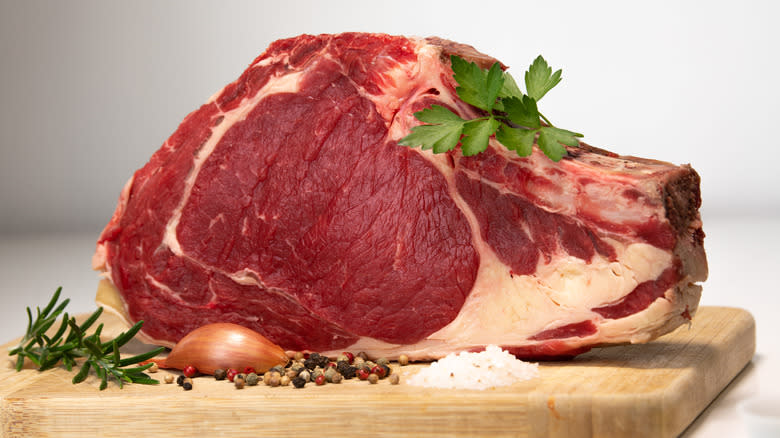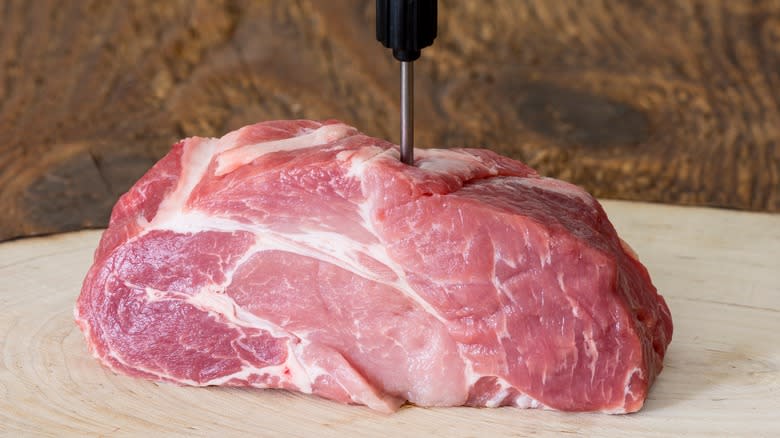Here's What Injecting Meat Actually Does To The Final Product

There are all sorts of tricks and methods for getting the most out of your meat beyond the obvious. Sous vide can be a great technique for cooking steaks to a perfect temperature, and even though everyone knows about marinating, the lesser-known, yet equally tasty reverse marinade is when you marinate your meat after grilling. But there's another technique you might also have heard of but never tried for yourself: Injecting your meat with a liquid.
There's a lot to know about injecting meat, but the biggest question is probably what does it actually accomplish? A lot, it turns out. While marinating meat is great for imbuing it with flavor, that only really applies to the outside of the meat. Injecting liquid into meat, however, moisturizes it, increases its tenderness, and fully imbues it with flavor all the way through. Though there are some other tips and tricks to know, from which liquids work best for injection to which meats are better suited for it, the most important thing to remember is that injection accomplishes a lot of the things people mistakenly believe marinating does.
Read more: 15 Tips For Making The Best Meatloaf
Injecting Accomplishes Everything People Think Marinating Does

It's a common misconception that marinades penetrate into the meat; generally, they don't get far past the surface. For this reason, marinades also don't usually have much of an effect in delivering flavor throughout the meat or tenderizing it (although an exception is fruit juice enzymes for meat tenderization). Injecting meat, though, gets around this issue, as you're quite literally delivering liquid past the skin into the center of the meat itself. This is the reason meat injections have long been the province of BBQ pit masters, but they're starting to become more popular with the general public, and for good reason. All you need to DIY is a marinade injector, which is easy to find online. The other benefit is that while brining or marinating can take hours, meat injection works pretty much immediately.
There are a few things to be aware of when it comes to injecting meat, though. If you're using enough liquid to really flavor the meat, some of it is coming out of that hole you made when you injected it. As such, injecting it on a cutting board is a bad idea -- make sure the meat is in a receptacle so the excess fluid doesn't create a huge mess. You also want to make sure you hit the meat in several different spots to evenly disperse the liquid, although you can change the injector's angle in the same hole to avoid dotting your meat with extraneous pockets. And make sure that if your mixture has ground spices in it, you use an injector with a thicker gauge so the seasoning doesn't get stuck.
Which Liquids To Use And Which Meats To Use It On

As far as which liquids to use, the answer is pretty much whatever you'd use in a marinade; you're not really limited here other than by your own imagination. A simple solution of butter and stock is always a good choice, but you could also go with a classic vinegar-based marinade, or use a brown sugar-based marinade on turkey. You could even inject your meat with beer, which gives it a great flavor (although you should probably avoid sour beers here). You should dilute the flavors more than you would with a marinade, though, especially when it comes to salt; because the meat is getting hit dead-on with the liquid and will retain more of it, the flavor will naturally come through stronger.
Some cuts will take to injecting far better than others. Though drier meats like turkey will get the most benefit, and it's well-known how injecting benefits BBQ, you can inject virtually any type of meat -- but you want to make sure the cut is right. In general, the types of meat you shouldn't bother injecting with marinades are thinner cuts that would get nearly as much benefit from simply marinating on the outside. This means steaks aren't generally a good choice for injection, nor are individual cuts of poultry. Larger items like roasts, brisket, pork butt, pork loin, or whole chickens and turkey are where you're going to see the most benefit.
Read the original article on The Daily Meal.

 Yahoo Lifestyle
Yahoo Lifestyle 
